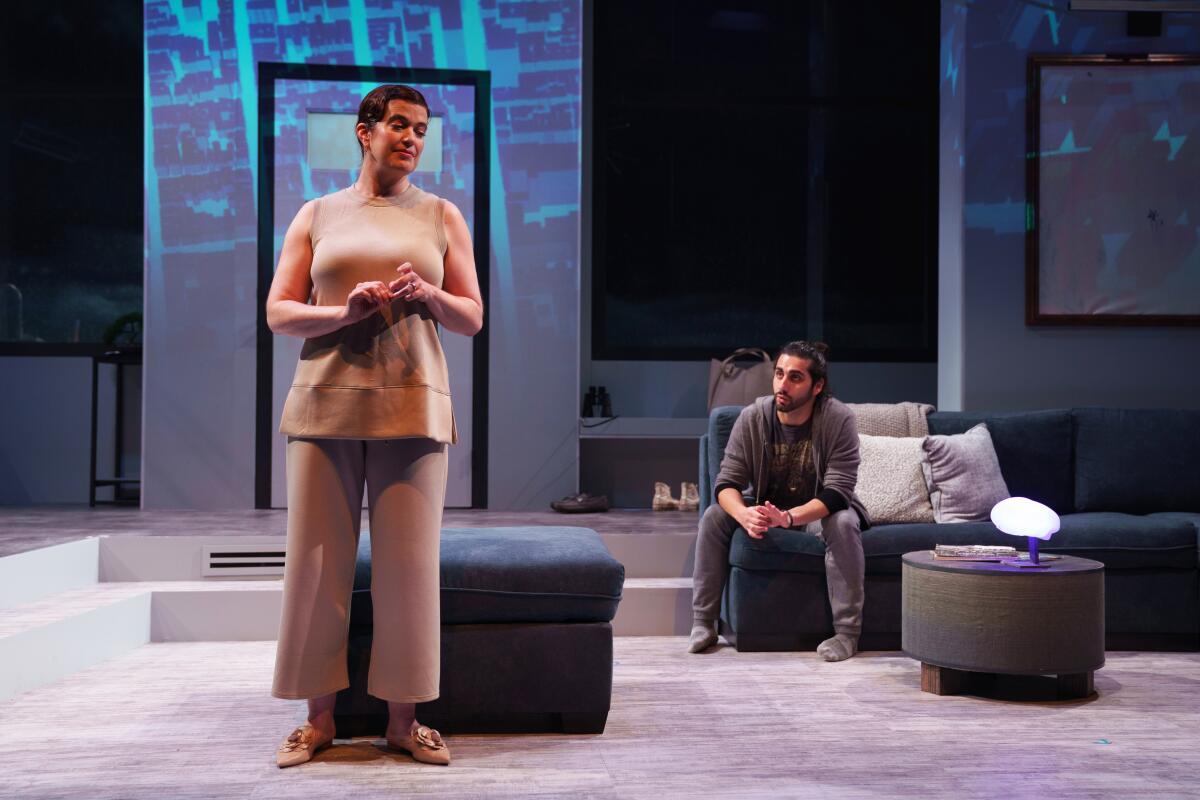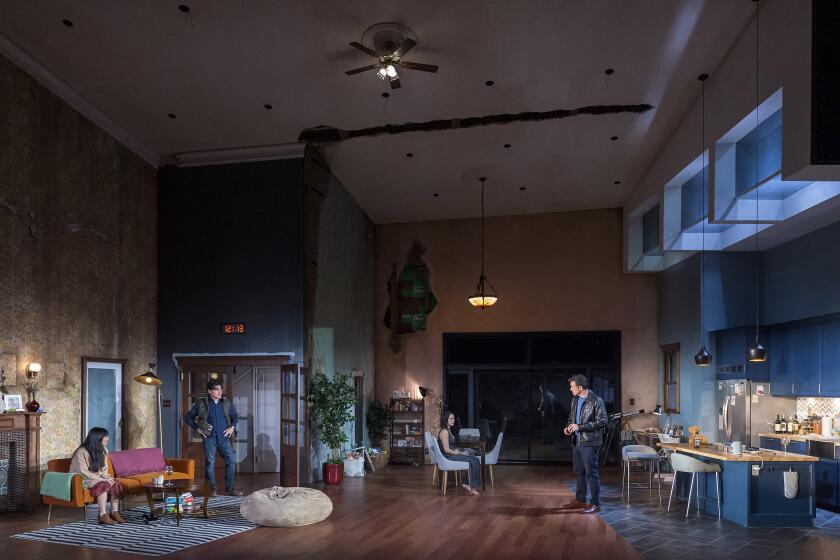Review: Geffen Playhouse’s ‘The Ants’ reveals just how perilous the horror genre can be

- Share via
Theater’s embrace of the horror play continues with “The Ants.” Ramiz Monsef’s contribution to the genre is a thriller with a social message that’s having its world premiere at the Geffen Playhouse’s Audrey Skirball Kenis Theater.
The drama revolves around a luxury house with a cutting-edge security system that has powers that have yet to be fully revealed even to the inhabitants. This house on a hill is designed as a state-of-the-art bunker, a residence that might appeal to war criminals with dangerous enemies or wealthy folks with supremely guilty consciences.
Shahid (Ryan Shrime) and Meredith (Megan Hill), the owners of this modern fortress, are house-proud to an extreme. Meredith designed the security system herself. Not all of its military-style capabilities could be tried out in advance, but she’s fairly certain the house could withstand any sustained attack short of a tank invasion or nuclear air strike.
Meredith’s hypothesis will soon be put to the test, but not before Shahid’s floundering brother, Nami (Nicky Boulos), turns up, once again down on his luck. Fired from his job and evicted from his apartment, he’s in need of a place to stay for the night.
Shahid is hurt that Nami is in touch only when he needs financial help, but he can’t refuse his brother a place to sleep. When Meredith returns home from work, she isn’t too pleased that Shahid is allowing Nami to freeload, but she consents for one night only.
And what a night it turns out to be! Before all hell breaks loose outside, all hell breaks loose inside. Domestic combat is almost immediately cranked up to 10.
The play’s U.S. premiere brings the horror, but wastes the talents of Constance Wu, Finn Wittrock, Anna Camp and Adam Rothenberg on creaky characters.
A strident perfectionist, Meredith has no sympathy for her brother-in-law’s inability to hold a job and keep a roof over his head. She also has no pity for the people experiencing homelessness at the bottom of the hill. She complains about their tents and the assistance they receive, and she hates the way they stare at her when she’s racing off to work in the morning in a huff.
Self-made, Meredith has had to overcome her own share of obstacles in a male-dominated field. She fought her way to the top and now feels entitled to kick anyone who’s flailing. Pull yourself up by your bootstraps isn’t just her philosophy — it’s her license to kill.
Nami resents the way Meredith calls Shahid Sean, erasing his Persian heritage. Worse, he can’t stand that Shahid has adopted Sean as his new identity, though Nami’s streetwise, hip-hop-inflected style seems just as much a masquerade.
His constant references to life in the “hood” are a red flag. “Stop acting like we grew up in South Philly or something,” Shahid remarks, though the point is not adequately pursued. Nami is positioned as more in touch with harsh reality than his wealthy brother and sister-in-law cocooned in their armored bubble. But that’s a fairly low bar.
Meredith browbeats her husband mercilessly. When Shahid reveals a secret of the house’s security system that’s controlled by a sci-fi gadget called the Brain (voiced by Hugo Armstrong), he worries that Meredith will be furious with him. “She’ll castrate me,” he says in a line that spells trouble not only for his marriage but also for Monsef’s play.
Meredith is a stereotypical virago updated with modern libertarian notions. A vegan who keeps a refrigerator full of overpriced organic, locally grown, small-batch greens, she has an imperious “let them eat kale” attitude toward anyone struggling.
Shahid is a milquetoast in designer casual wear. His oppression at the hands of a white woman is the price he seems willingly to pay for affluent assimilation.
Nami is an emissary from a world riven by economic inequality. He’s meant to be our way into the story, the reasonable outsider with respect for family ties. But his own inauthenticity is underexamined.
The growing multitude of people camped out at the bottom of the hill plays a role in the rapidly escalating tensions that go beyond Nami’s distress about being served nothing but “rabbit food.” The security features of the house, defensive as well as offensive, will be christened as the threats multiply.
Technology may be on Meredith’s side, though the opposition has the numbers. (The title is a metaphor that illustrates this very point.) But it’s hard to take anything too seriously. The characterizations are exaggerated, the dialogue is stilted and the plot induces a fair amount of eye-rolling. (I’m not even going to get into the role of the Pizza Guy, played by Jeremy Radin, whose precise path in the story still seems unsettled.)
Do you know what really scares a theater critic? Being trapped in a room with unpleasant characters in a contrived drama that wants to have its genre thrills and Important Message too.
It’s hard to determine in a brand-new play how much fault should be apportioned to the playwright and how much to the director. Suffice it to say that Pirronne Yousefzadeh’s direction compounds the problems of the writing.
The production tries to make do with presumably a limited budget, but scenic designer Carolyn Mraz fails to create the illusion of an enviably posh house of the future. (The set looks like an apartment awash in nice-enough IKEA.)
The choices of costume designer Dominique Fawn Hill seem only to draw out the characters’ most unprepossessing personality features. (Meredith’s boxy outfit when she arrives home from the office leaves an unflattering martial impression and her switch to formal wear seems motivated chiefly by the logistical challenge set by the play’s ending.) Hana S. Kim’s projections add a cinematic kick to the staging but can’t cover up the myriad dramatic shortcomings.
There’s one acting note I wish someone had passed on to the cast: When playing characters of temperamental extremes, actors should resist making melodramatic matters worse. Subtlety is their friend if resembling a human being is the goal.
“The Ants” is bookended in surreal monologues spoken by a creature that might seem to be a right-wing nightmare conjured by AI. The reality is less chilling. The horror on stage is merely a play that has been prematurely released into the world.
'The Ants'
Where: Geffen Playhouse, Audrey Skirball Kenis Theater, 10886 Le Conte Ave., L.A.
When: 8 p.m. Tuesdays-Fridays, 3 and 8 p.m. Saturdays, 2 and 7 p.m. Sundays. Ends July 30
Tickets: currently $39 - $129
Contact: geffenplayhouse.org, (310) 208- 2028
Running time: 2 hours, 20 minutes
More to Read
The biggest entertainment stories
Get our big stories about Hollywood, film, television, music, arts, culture and more right in your inbox as soon as they publish.
You may occasionally receive promotional content from the Los Angeles Times.












